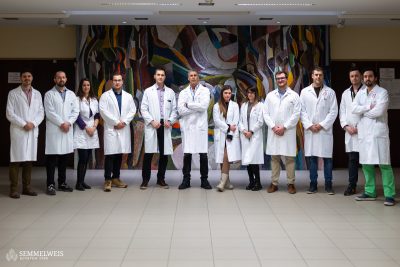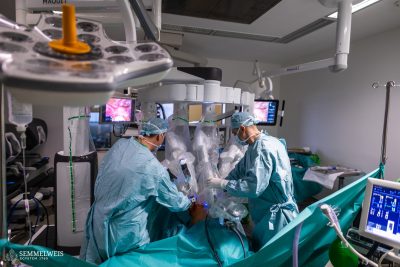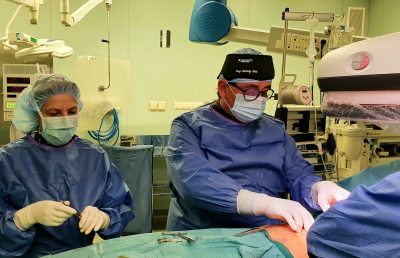Luca is 21 months old. Her favorite is Bing Bunny, she loves being outdoors, swinging, playing in the sand or mud, and jumping in puddles. In other words, she is just like any of her mates. At the same time, she is one of the approximately 20-25 children who are born with cystic fibrosis (CF) in a year in Hungary, a genetic disease that affects several organs. And she is the first to be diagnosed with the disease at the Pediatric Center of Semmelweis University at the age of just a few weeks – thanks to the newborn CF screening program launched nationwide at the beginning of last year.
We were very scared when, based on the results of the newborn blood test, we were called in for a sweat test, and then the disease was confirmed. We didn’t even know what we were up against, but we were told that the outcome of the disease could be such that a lung or liver transplant might be needed later. I wouldn’t wish the first year and a half on anyone, I got really sick, I calmed down a bit at the one-year check-up
, remembers the beginnings Luca’s mother.
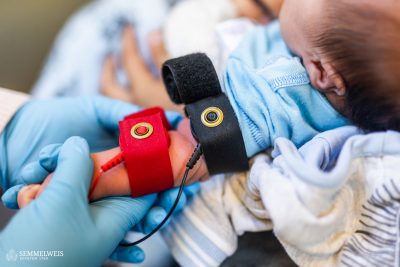
Fortunately, the little girl is developing very well and is symptom-free with the therapy. “Both the parents and the children must learn to live with this disease. Luca is constantly receiving the necessary treatments, we go to Dr. Judit Kincs at the Pediatric Center, we inhale twice a day, after that we perform the special round lung percussion, all of this has become natural for us now, said the mother, emphasizing that it means a lot to them to know that they are in good hands and that they can count on the doctor at any time. “Our little girl had no symptoms at birth, and to this day it is incomprehensible to us that here is a seemingly healthy, smart, sensible, beautifully developing child, who at the same time has such a serious illness. We don’t know why this happened to us, but it’s good that thanks to the screening, we can know about the disease from the beginning, and so we can do everything from the first moment to ensure that our little girl is well,” said Luca’s mother.
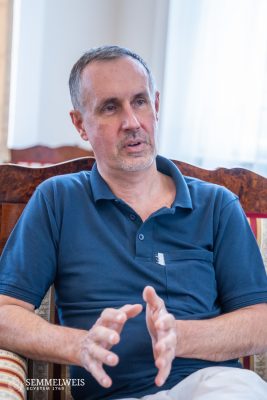 In Hungary, the mandatory CF screening program for newborns was launched in January 2022, increasing the number of rare hereditary diseases examined with metabolic screening after birth to 27. The Pediatric Center of Semmelweis University – as one of the two centers in the country where blood samples are evaluated and which is a leading CF care center – played an active role in the preparation for the introduction of cystic fibrosis screening, stressed Center Director Dr. Attila Szabó, president of the university’s Clinical Center. Although CF is a rare disease, it is the most common of the so-called autosomal recessive genetic diseases in Europe. It involves the production of abnormal secretions by the exocrine glands, it mainly causes serious respiratory and digestive complications, but it also damages other organs, explained the director, emphasizing that, based on international experience, it is clear that where this disease is screened after birth, the life expectancy and quality of life of those affected is also better. The importance of the screening is enhanced by the fact that since last fall, a new treatment method, the CFTR modulator therapy, has been available in Hungary, which affects the basis of the development of the disease, that is, the function of the chloride channel damaged due to the genetic mutation.
In Hungary, the mandatory CF screening program for newborns was launched in January 2022, increasing the number of rare hereditary diseases examined with metabolic screening after birth to 27. The Pediatric Center of Semmelweis University – as one of the two centers in the country where blood samples are evaluated and which is a leading CF care center – played an active role in the preparation for the introduction of cystic fibrosis screening, stressed Center Director Dr. Attila Szabó, president of the university’s Clinical Center. Although CF is a rare disease, it is the most common of the so-called autosomal recessive genetic diseases in Europe. It involves the production of abnormal secretions by the exocrine glands, it mainly causes serious respiratory and digestive complications, but it also damages other organs, explained the director, emphasizing that, based on international experience, it is clear that where this disease is screened after birth, the life expectancy and quality of life of those affected is also better. The importance of the screening is enhanced by the fact that since last fall, a new treatment method, the CFTR modulator therapy, has been available in Hungary, which affects the basis of the development of the disease, that is, the function of the chloride channel damaged due to the genetic mutation.
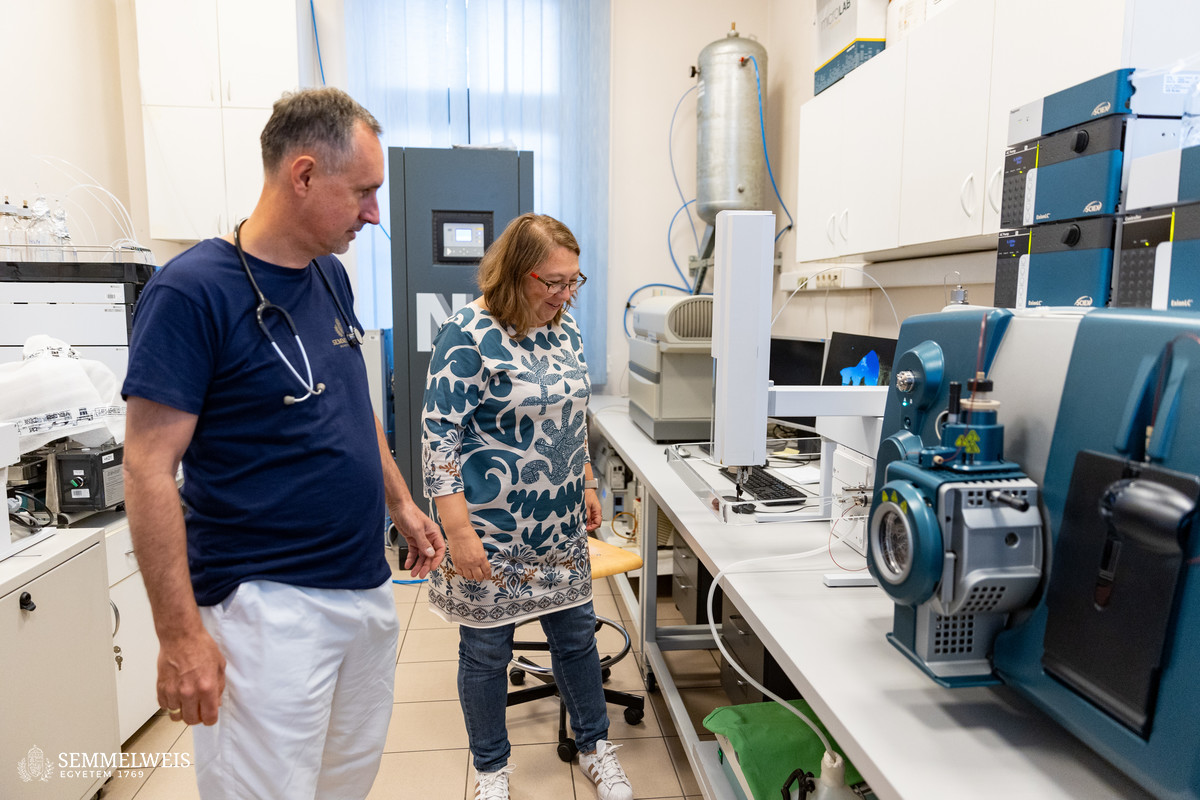
Before the introduction of the screening test, children had often already reached school age, and it happened after going from doctor to doctor until they found the answer to the wide-ranging symptoms and received the diagnosis. During this amount of time, the disease causes irreversible damage not only to the respiratory system and liver, but also to the development of the children. It is no coincidence that a significant number of young lung transplant recipients have CF.
It is unique in the country that our clinic offers all kinds of care in one place, from newborn to lung transplant care. Given that CF affects almost every organ system, patients are cared for from birth to adulthood by a multidisciplinary team of pulmonologists, gastroenterologists, liver specialists, surgeons, endocrinologists, dietitians, physiotherapists and psychologists. In addition to all this, my colleagues created a special respiratory function laboratory that is unique not only in our country, but also outstanding at the international level, explained Dr. Attila Szabó.
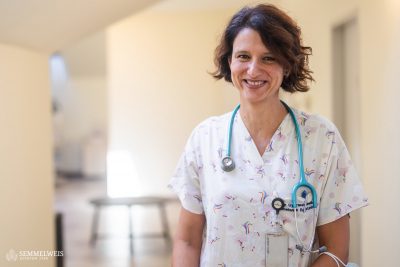 “It is a big step forward that, thanks to the screening, we can start the treatment in time, and with this it is possible that the symptoms do not develop at all until later, in the early years. At the same time, it is a huge psychological burden for the family that a seemingly healthy child turns out to have a serious illness”, says Dr. Judit Kincs, chief physician of the department, who is the CF screening coordinator at the clinic.
“It is a big step forward that, thanks to the screening, we can start the treatment in time, and with this it is possible that the symptoms do not develop at all until later, in the early years. At the same time, it is a huge psychological burden for the family that a seemingly healthy child turns out to have a serious illness”, says Dr. Judit Kincs, chief physician of the department, who is the CF screening coordinator at the clinic.
As she detailed, cystic fibrosis can be confirmed with a lengthy but completely painless sweat test. For this examination, those newborns are invited in whose case the cystic fibrosis marker gave an abnormal value in the mandatory newborn screening.
The goal is to have the sweat test performed on all affected kids by the age of six weeks at the latest. And in the case of a positive result, the multidisciplinary team providing care will introduce itself to the parents the week after the diagnosis is presented, pointed out Dr. Judit Kincses.
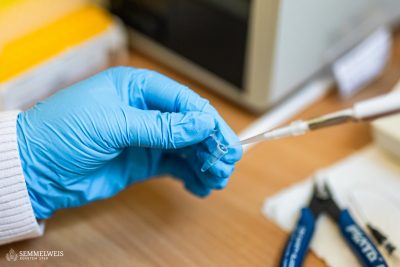 Without treatment, the first symptoms can usually appear at the age of a few months, in the form of malabsorption due to involvement of the pancreas. If the disease is diagnosed in time, it can be treated with digestive enzymes so that growth failure does not develop, and the fact that the baby is developing well also helps a lot in preventing lung symptoms. If a child is found to have cystic fibrosis, the parents are given genetic counseling, and the non-adult siblings are sweat tested, she pointed out.
Without treatment, the first symptoms can usually appear at the age of a few months, in the form of malabsorption due to involvement of the pancreas. If the disease is diagnosed in time, it can be treated with digestive enzymes so that growth failure does not develop, and the fact that the baby is developing well also helps a lot in preventing lung symptoms. If a child is found to have cystic fibrosis, the parents are given genetic counseling, and the non-adult siblings are sweat tested, she pointed out.
Asymptomatic CF babies must come for a check-up every month at first, then every two months, and every three months over the age of one year, and if any symptoms appear (e.g. cough, suffocation), they must report immediately. Parents are taught to perform physical therapy, expectoration and inhalation – these should be incorporated into the daily routine at home.
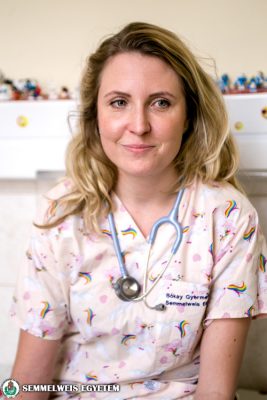 In cystic fibrosis, special emphasis is placed on the continuous examination of the lungs. The most basic respiratory function test used in this disease is spirometry, the well-known exhalation test. However, this cannot be used reliably before the age of 6, on the other hand, we can only detect late lung changes with it, explained Dr. Dorottya Czövek, teaching assistant at the center, head of the special respiratory function laboratory. That is why it is a hot topic worldwide what can be an alternative to spirometry. The gas washout technique (multiple breath washout – MBW), which is already widely used at the international level, is available in Hungary only in the innovative respiratory function laboratory set up at the Pediatric Center of Semmelweis University. Dr. Dorottya Czövek gained her experience abroad, who during her several years of research and clinical work in Switzerland and Australia, primarily dealt with cystic fibrosis and other rare diseases. This technique can be used to examine how heterogeneous the structure of the lungs is, but it can only be used in people over 3 years of age.
In cystic fibrosis, special emphasis is placed on the continuous examination of the lungs. The most basic respiratory function test used in this disease is spirometry, the well-known exhalation test. However, this cannot be used reliably before the age of 6, on the other hand, we can only detect late lung changes with it, explained Dr. Dorottya Czövek, teaching assistant at the center, head of the special respiratory function laboratory. That is why it is a hot topic worldwide what can be an alternative to spirometry. The gas washout technique (multiple breath washout – MBW), which is already widely used at the international level, is available in Hungary only in the innovative respiratory function laboratory set up at the Pediatric Center of Semmelweis University. Dr. Dorottya Czövek gained her experience abroad, who during her several years of research and clinical work in Switzerland and Australia, primarily dealt with cystic fibrosis and other rare diseases. This technique can be used to examine how heterogeneous the structure of the lungs is, but it can only be used in people over 3 years of age.
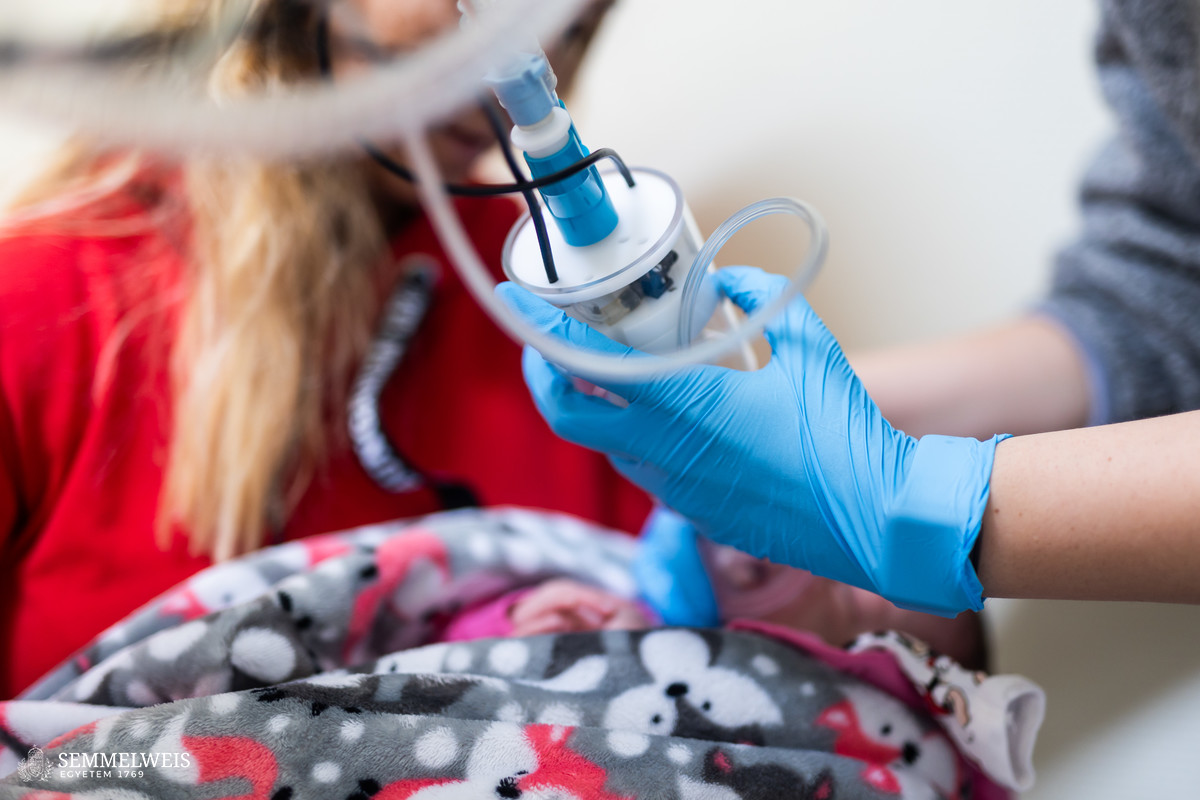 A Hungarian innovation, which is currently in the research phase, offers the opportunity to test the respiratory function of babies younger than this, even newborns, which is unique in the country. With the oscillometric technique, we can determine the resistance of the airways and the flexibility of the lung tissue, and it is performed on all babies diagnosed with CF. In relation to how important this is in the development of the clinical picture and the treatment of the disease, intensive research is currently underway, pointed out Dr. Dorottya Czövek. At the same time, the fact that the screened-out children are tested from the beginning and regularly with this device can clearly show the progress of the disease, she added.
A Hungarian innovation, which is currently in the research phase, offers the opportunity to test the respiratory function of babies younger than this, even newborns, which is unique in the country. With the oscillometric technique, we can determine the resistance of the airways and the flexibility of the lung tissue, and it is performed on all babies diagnosed with CF. In relation to how important this is in the development of the clinical picture and the treatment of the disease, intensive research is currently underway, pointed out Dr. Dorottya Czövek. At the same time, the fact that the screened-out children are tested from the beginning and regularly with this device can clearly show the progress of the disease, she added.
Non-invasive respiratory support plays a major role in CF if the symptoms affecting the lungs worsen. When the respiratory function of a child with CF has fallen below 50 percent, it is worthwhile to perform a sleep study, and if the result shows abnormal values, then the setting of non-invasive respiratory support will be necessary. 85 children are currently being treated in the Center’s Non-Invasive Home Respiration Program, six of them with CF.
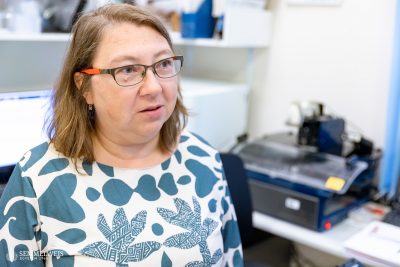 The US-based Center for Disease Control and Prevention lists mandatory newborn screening tests for congenital metabolic diseases as one of the ten most important health care services, emphasized Dr. Ildikó Szatmári, scientific associate of the Pediatric Center, head of the metabolic laboratory. Screening is carried out in two places in the country, at Semmelweis University and at the University of Szeged. In the days after birth, a blood sample is taken from the heel of the newborn at the local hospital. This is placed on a filter paper, which is sent to the centers, and the colleagues perform the diagnosis using special methods from the blood drops on the filter paper.
The US-based Center for Disease Control and Prevention lists mandatory newborn screening tests for congenital metabolic diseases as one of the ten most important health care services, emphasized Dr. Ildikó Szatmári, scientific associate of the Pediatric Center, head of the metabolic laboratory. Screening is carried out in two places in the country, at Semmelweis University and at the University of Szeged. In the days after birth, a blood sample is taken from the heel of the newborn at the local hospital. This is placed on a filter paper, which is sent to the centers, and the colleagues perform the diagnosis using special methods from the blood drops on the filter paper.
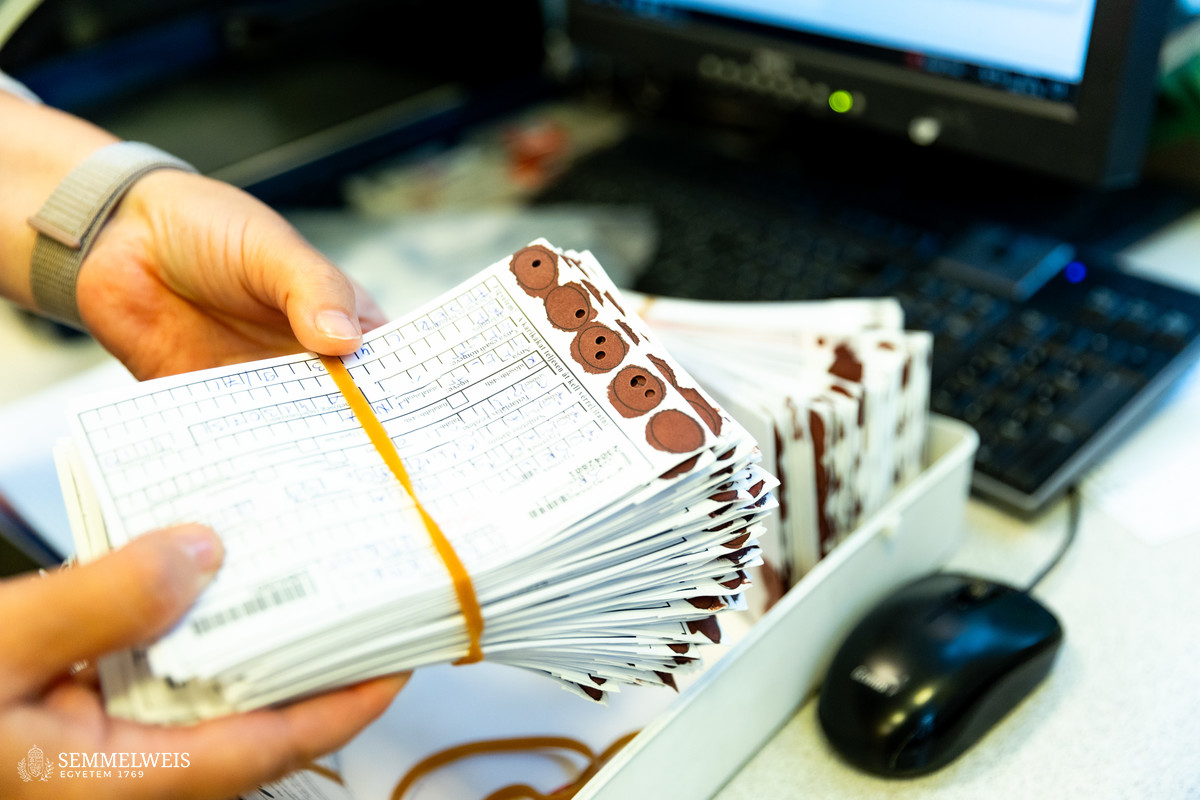 “To screen for CF, we examine the level of immunoreactive trypsinogen. Based on the degree of deviation, we decide whether it is sufficient to repeat the blood test in the first round, or whether it is necessary to call the baby in for a sweat test right away. During the analysis of the blood samples, it is very important to disturb and scare the least number of families possible, and at the same time, not a single patient should slip through our filter,” explained Dr. Ildiko Szatmári.
“To screen for CF, we examine the level of immunoreactive trypsinogen. Based on the degree of deviation, we decide whether it is sufficient to repeat the blood test in the first round, or whether it is necessary to call the baby in for a sweat test right away. During the analysis of the blood samples, it is very important to disturb and scare the least number of families possible, and at the same time, not a single patient should slip through our filter,” explained Dr. Ildiko Szatmári.
The staff of the center published a publication about the experiences of the first year – based on national data – in the International Journal of Neonatal Screening. According to this, almost 88,400 newborn metabolic tests were carried out nationwide, and in connection with cystic fibrosis, a positive result was obtained in 1,331 cases, and the specialists decided to repeat the blood test and in 1,171 cases. Eventually, a total of 256 newborns had to be called in for a sweat test or a clinical examination, and CF was confirmed in 18 cases.
Pálma Dobozi
Translation: Mária Sánta
Photo: Bálint Barta, Attila Kovács – Semmelweis University
